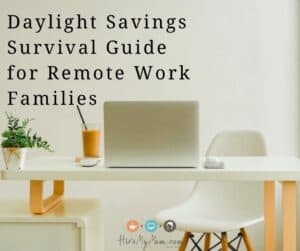What to Avoid When Searching for a Work-from-Home Job

The freedom of working from home is incredibly appealing—especially for moms looking to balance career and family. But with this rise in demand comes a rise in risk. Unfortunately, not all remote job listings are legitimate, and many applicants fall victim to scams disguised as opportunities.
At HireMyMom.com, we hear it all the time: “I thought it was real until they asked me to pay to apply,” or “The job sounded perfect but turned out to be a fake company.”
This post will help you avoid the most common work from home job scams, identify red flags to avoid in remote job listings for moms, and feel confident knowing where to safely search for flexible, legitimate work.
Why Work-from-Home Scams Are on the Rise
With more companies embracing remote work, scammers are capitalizing on the popularity by creating fake job posts, impersonating real companies, or using platforms with little to no vetting.
According to the Federal Trade Commission, work-from-home job scams cost U.S. job seekers millions each year. Women, especially moms looking for flexible or part-time work, are often targeted due to their higher likelihood of searching for remote roles.
This makes knowing what to avoid more important than ever.
7 Red Flags to Avoid in Remote Job Listings for Moms
1. They Ask You to Pay to Apply
Legitimate employers do not charge application fees. If a job post requires payment to apply or access “exclusive listings,” it’s a red flag.
Avoid: Jobs requiring fees or vague details without a clear hiring process.
2. Vague Job Descriptions or No Company Name
A real job will include specific responsibilities, hours, and required qualifications. Posts with little detail, no company website, or suspicious email addresses should be avoided.
3. Unprofessional Communication
Typos, grammar errors, and generic responses are early signs the opportunity may not be real.
Tip: Always Google the company name and cross-check the job on their official site. Also search for their social media profiles.
4. “Too Good to Be True” Pay
If a job promises $100/hour for data entry or requires no skills or experience for high pay, be cautious.
Note: Scammers rely on flashy numbers to attract vulnerable applicants.
5. Requests for Personal or Financial Info
You should never be asked to send your Social Security Number, banking details, or a copy of your ID before being onboarded to a new job.
6. Pressure to Act Fast
“Apply now! Only a few spots left!” Scammers use urgency to prevent you from doing research or asking questions.
7. No Interview Process
Legitimate jobs involve vetting. If you’re “hired on the spot” without any assessment or live interaction, proceed with caution.
How HireMyMom Protects You from Work-from-Home Job Scams
We know how frustrating (and scary) job scams can be. That’s why HireMyMom.com is built on trust, transparency, and a commitment to safety. Here’s what makes us different:
- Every employer is screened and verified before posting
- U.S.-based jobs only from small businesses
- Real testimonials and success stories from job seekers
“I was able to secure a position on HireMyMom in just a little over one month! The job postings on HireMyMom are not only legitimate, but they’re for businesses that are eager and ready to hire MOMS, specifically! As a freelancer, I’ve always been skeptical about applying for jobs at times due to the peculiar nature of being a WAHM who homeschools and also has a child with a disability. This is not the case with HireMyMom. Every job I apply for or interview for, it’s already been stated ahead of time for me, since the hiring manager knows they’re hiring a mom looking for a flexible job (I mean, they’re literally posting a job on hiremymom.com!) This has tremendously helped my confidence in applying for jobs. I know there are so many other moms that are tired of wasting their time on sketchy freelance sites or scrolling endlessly for job opps inside of Facebook groups, and I wish they too knew about HireMyMom. Thank you Lesley and the rest of the HMM team for building such a unique and reputable job board of work opportunities and job seeker resources for moms like myself!” — Yasmin Duque
Create Your Free Profile and Browse Our Legitimate Job Listings
What to Do If You Suspect a Scam
Even with caution, scammers are getting smarter. If you encounter a suspicious job post, take the following steps:
- Stop communication immediately
- Report the scam to the FTC (reportfraud.ftc.gov)
- Alert the platform where you found it
- Change passwords if you shared login credentials
When in doubt, trust your instincts. If something feels off, it probably is.
FAQ: Work-from-Home Job Safety
How can I know if a job is real?
Look for a legitimate company name, website, and clear communication. If you’re unsure, search the company on LinkedIn or Glassdoor.
What should I do if I already shared information?
Report it immediately to the FTC and monitor your accounts closely. Change any compromised passwords.
How does HireMyMom keep jobs safe?
We manually review every job post and require employers to verify themselves before their listings go live.
Final Thoughts: Empowered, Informed, and Scam-Free
Working from home offers incredible flexibility—but only if the job is real. By knowing what to avoid and using trusted platforms like HireMyMom, you can confidently move forward in your remote job search.
If you’re a mom looking for flexible, legitimate work-from-home opportunities:
Create Your Profile and Start Applying Today
If you’re a business owner who wants to support remote moms while growing your team:
Post Your Job and Find Qualified Help Now
Stay Safe, Stay Smart
Get expert tips, scam alerts, and legitimate job opportunities sent straight to your inbox.
Join Our Newsletter for weekly New Job Posts or download our free “How to Get Hired – Your Complete Guide to Finding Flexible Remote Work Guide”.







